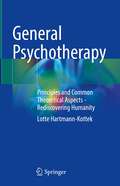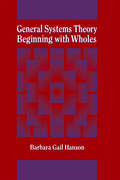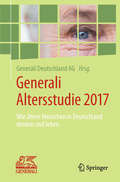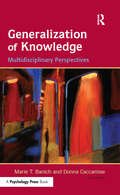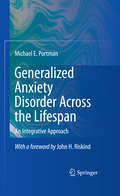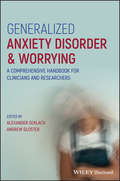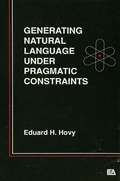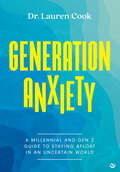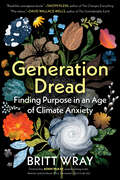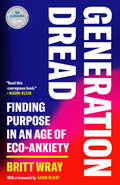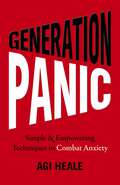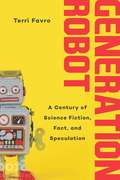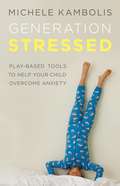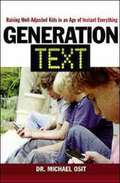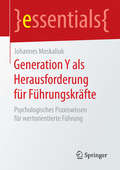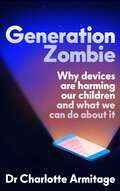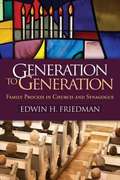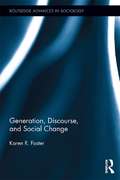- Table View
- List View
General Psychotherapy: Principles and Common Theoretical Aspects - Rediscovering Humanity
by Lotte Hartmann-KottekThis book highlights common similarities between the various schools of psychotherapy. It provides psychotherapists with the underlying neurophysiological, developmental psychological and relationship-oriented matrix (basic needs and their regulation, deficits, trauma and conflict processing patterns, including accompanying exercises) as well as opportunities for healing correction and stabilisation - and the ways in which to apply these methods in a therapeutically mindful way for the benefit of the patient. The new university-based psychotherapy training covers the four fundamental schools of psychotherapy, i.e. the previous standard approaches plus the systemic and humanistic ones. Focusing on the common ground builds bridges of understanding and encourages collaboration. This expanded, new range of methods to access patients constitutes a substantial development in the field of psychotherapy and will also influence the psychotherapy practice of experienced colleagues. Written for medical and psychological psychotherapists, psychosomatic doctors, psychiatrists and other specialists with additional psychotherapeutic qualifications, and for students of psychotherapy.
General Systems Theory - Beginning With Wholes: Beginning with Wholes
by Barbara G. HansonFirst published in 1995. Routledge is an imprint of Taylor & Francis, an informa company.
Generali Altersstudie 2017: Wie ältere Menschen in Deutschland denken und leben
by Martin LayWie ticken alte Menschen wirklich? Wer wissen will, wie die 65- bis 85-jährigen heute leben und welche Einstellungen sie prägen, bekommt hier fundierte und leicht verständliche Antworten.Die Diskussion über eine älter werdende Gesellschaft braucht klare Fakten. Die Generali Altersstudie liefert die umfassendste empirische Untersuchung zur Lebenssituation und den Perspektiven der Menschen zwischen 65 und 85 Jahren in Deutschland. Viele der repräsentativen Antworten der über 4.000 Befragten verblüffen und räumen mit vielen Vorurteilen über das Alter auf.Im Auftrag der Generali Deutschland AG hat das renommierte Institut für Demoskopie Allensbach diese Untersuchung nach 2013 zum zweiten Mal durchgeführt. Verständlich kommentiert werden die Ergebnisse von den namhaftesten deutschen Altersforschern. Diese anschauliche, gut illustrierte Studie, unterhaltsam und lehrreich aufbereitet als Sachbuch, wird für viele ein Augenöffner sein und die politische und gesellschaftliche Diskussion über die Teilhabe der Alten vorantreiben.
Generalization of Knowledge: Multidisciplinary Perspectives
by Marie T. BanichWhile the notion of generalization fits prominently into cognitive theories of learning, there is surprisingly little research literature that takes an overview of the issue from a broad multifaceted perspective. This volume remedies this by taking a multidisciplinary perspective on generalization of knowledge from several fields associated with Cognitive Science, including Cognitive Neuroscience, Computer Science, Education, Linguistics, Developmental Science, and Speech, Language and Hearing Sciences. Researchers from each perspective explain how their field defines generalization - and what practices, representations, processes, and systems in their field support generalization. They also examine when generalization is detrimental or not needed. A principal aim is the identification of general principles about generalization that can be derived from triangulation across different disciplines and approaches. Collectively, the contributors’ multidisciplinary approaches to generalization provide new insights into this concept that will, in turn, inform future research into theory and application, including tutoring, assistive technology, and endeavors involving collaboration and distributed cognition.
Generalized Anxiety Disorder Across the Lifespan
by Michael E. PortmanGeneralized anxiety disorder is a chronic, disabling, often lifelong condition affecting millions worldwide. Yet, despite its prevalence, GAD is frequently marginalized, misdiagnosed, and undertreated. Generalized Anxiety Disorder Across the Lifespan creates a practical knowledge base for GAD, identifying the symptoms that set it apart both from "normal, everyday" anxiety and from other anxiety-based pathologies, and thoroughly reviewing the range of established and cutting-edge treatments. The author's developmental approach sheds some light on longstanding clinical mysteries surrounding the disorder, among them the interplay of somatic and psychological symptoms and the changes in symptoms as patients age. Accessible to the novice or the veteran reader, the book: Grounds readers in the basics of GAD Offers extensive discussion of the current psychosocial treatments for GAD Examines the state of the art in pharmacological therapies with explanations of the genetic and neurobiological correlates Explores special issues, cultural considerations, treatment resistant patients, and prevention Includes guidelines for treatment of GAD in children, adolescents, adults, and older adults Features ready-to-use assessment tools for clients across the lifespan. Generalized Anxiety Disorder Across the Lifespan is a rich resource for clinicians, researchers, and graduate students looking to improve patients' quality of life--and the quality of their care. It is both a guide to current best practice and a springboard for future innovations.
Generalized Anxiety Disorder and Worrying: A Comprehensive Handbook for Clinicians and Researchers
by Alexander L. Gerlach Andrew T. GlosterA comprehensive and authoritative guide to anxiety disorder and worry Generalized Anxiety Disorder offers a comprehensive review of the most current research and therapeutic modalities related to generalized anxiety disorder and worry (GAD). With contributions from an international panel of experts, the Handbook links the basic science of anxiety and worry to the effective treatments that can be applied to help those who suffer from these conditions. Reflecting the most recent research and developments on the topic, the Handbook contains information on cross-cultural issues, transdiagnostic questions, as well as material on learning theory, biological theory, psychotherapy, and psychopharmacology. The contributors offer an in-depth examination of a range of topics such as rumination and obsessions and contains several novel approaches to treating the disorder. This comprehensive resource: Contains the most current information available on the topic Explores the consequences of worrying and other mental disorders such as illness anxiety and sleep disorders Includes contributions from an international panel of experts Offers insight into the future of treatment outcomes and translational research Written for practitioners, researchers, and trainees of clinical psychology and psychiatry, Generalized Anxiety Disorder addresses the assessment and empirically supported treatment of generalized anxiety disorder.
Generating Natural Language Descriptions With Integrated Text and Examples
by Vibhu O. MittalThis book discusses issues in generating coherent, effective natural language descriptions with integrated text and examples. This is done in the context of a system for generating documentation dynamically from the underlying software representations. Good documentation is critical for user acceptance of any complex system. Advances in areas such as knowledge-based systems, natural language, and multimedia generation now make it possible to investigate the automatic generation of documentation from the underlying knowledge bases. This has several important benefits: it is always accessible; it is always current, because the documentation reflects the underlying representation; and, it can take the communication context, such as the user, into account. The work described in this book compiles results from cognitive psychology and education on effective presentation of examples, as well as work on computational generation of examples from intelligent tutoring systems. It also takes into account computational learning from examples, and a characterization of good examples for just this purpose. Issues arising from these research areas--as well as issues coming from the author's own corpus analysis of instructional and explanatory texts--are discussed in the context of generating natural language descriptions of software constructs. A text planner is used for a hierarchy of communicative goals. Examples are treated as an integral part of the planning process and their interaction with text is represented at all stages. The strengths and limitations of this approach are also discussed. Although the focus of this book is the generation of natural language descriptions, a similar set of issues need to be addressed in the generation of multimedia descriptions. This book will be of interest to all researchers working in the areas of natural language interfaces, intelligent tutoring systems, documentation and technical writing, and educational psychology.
Generating Natural Language Under Pragmatic Constraints
by Eduard H. HovyRecognizing that the generation of natural language is a goal- driven process, where many of the goals are pragmatic (i.e., interpersonal and situational) in nature, this book provides an overview of the role of pragmatics in language generation. Each chapter states a problem that arises in generation, develops a pragmatics-based solution, and then describes how the solution is implemented in PAULINE, a language generator that can produce numerous versions of a single underlying message, depending on its setting.
Generation Anxiety: A Millennial and Gen Z Guide to Staying Afloat in an Uncertain World
by Lauren CookFrom licensed clinical psychologist and TikTok therapist Dr. Lauren Cook comes this practical, relatable guide for millennials and Gen Z-ers struggling with anxiety.Millennials and Gen Z-ers are considered two of the most anxious generations in history. With many intense generation-specific stressors facing them in recent years – from climate change to political polarization, systemic racism, gun violence, financial instability and so much more – it&’s easy to see why more and more people are being diagnosed with anxiety at alarming rates.Taking a feminist and intersectional lens, Dr. Lauren Cook shares her own struggles with anxiety and provides easy, actionable steps to ride the waves of anxiety rather than constantly swimming against them. Chapters show you how you can learn to embrace anxiety, find those who can help you, incorporate preventative self-care strategies and stay afloat when it feels like anxiety is overwhelming you. Exercises include doing inner child work, gratitude lists, mindfulness for body neutrality and much more.This relatable, honest and information-packed book incorporates thorough, evidence-backed psychological research and diverse client experiences to illustrate a broad range of presentations of anxiety and help readers gain insight into their own stressors and effectively work through anxiety.
Generation Dread: Finding Purpose In An Age Of Climate Anxiety
by Britt Wray“Generation Dread is a vital and deeply compelling read.”—Adam McKay, award-winning writer, director, and producer (Vice, Succession, Don’t Look Up) “Read this courageous book.”—Naomi Klein, author of This Changes Everything “Wray shows finally that meaningful living is possible even in the face of that which threatens to extinguish life itself.”—Dr. Gabor Maté, author of When the Body Says No When we’re faced with record-breaking temperatures, worsening wildfires, more severe storms, and other devastating effects of climate change, feelings of anxiety and despair are normal. In Generation Dread, Britt Wray reminds us that our distress is, at its heart, a sign of our connection to and love for the world. The first step toward becoming a steward of the planet is connecting with our climate emotions—seeing them as a sign of our humanity and empathy and learning how to live with them. Britt Wray, a scientist and expert on the psychological impacts of the climate crisis, brilliantly weaves together research, insight from climate-aware therapists, and personal experience, to illuminate how we can connect with others, find purpose, and thrive in a warming, climate-unsettled world.
Generation Dread: Finding Purpose in an Age of Climate Crisis
by Britt WrayFINALIST FOR THE GOVERNOR GENERAL'S LITERARY AWARDA CBC BEST CANADIAN NONFICTION BOOK OF 2022AN INDIGO TOP TEN BEST SELF-HELP BOOK OF 2022"A vital and deeply compelling read.&” —Adam McKay, award-winning writer, director and producer (Don&’t Look Up)&“Britt Wray shows that addressing global climate change begins with attending to the climate within.&” —Dr. Gabor Maté, author of The Myth of Normal"Read this courageous book.&” —Naomi KleinAn impassioned generational perspective on how to stay sane amid climate disruption.Climate and environment-related fears and anxieties are on the rise everywhere. As with any type of stress, eco-anxiety can lead to lead to burnout, avoidance, or a disturbance of daily functioning. In Generation Dread, Britt Wray seamlessly merges scientific knowledge with emotional insight to show how these intense feelings are a healthy response to the troubled state of the world. The first crucial step toward becoming an engaged steward of the planet is connecting with our climate emotions, seeing them as a sign of humanity, and learning how to live with them. We have to face and value eco-anxiety, Wray argues, before we can conquer the deeply ingrained, widespread reactions of denial and disavowal that have led humanity to this alarming period of ecological decline.It&’s not a level playing field when it comes to our vulnerability to the climate crisis, she notes, but as the situation worsens, we are all on the field—and unlocking deep stores of compassion and care is more important than ever. Weaving in insights from climate-aware therapists, critical perspectives on race and privilege in this crisis, ideas about the future of mental health innovation, and creative coping strategies, Generation Dread brilliantly illuminates how we can learn from the past, from our own emotions, and from each other to survive—and even thrive—in a changing world.
Generation Panic
by Agi Heale'This book is a gem. It is accessible, practical and embodies the empathy that is truly therapeutic.' Dr David Pendleton, Professor in Leadership, Henley Business School.Feeling anxious and on the back foot? No idea where or how to start getting relief? Anxiety making you feel overwhelmed and alone? In bite-sized chapters, Generation Panic is a simple, easy-to-follow guide that teaches you to take back control and combat your anxiety. With its dip-in-and-out format, Generation Panic is ideal for busy professionals in their twenties and thirties who are not feeling themselves, are out of control and are struggling to manage their anxiety. From setting boundaries to using the 7-7-7 breathing method, Generation Panic sets out over 100 quick techniques. Start learning all the tools and techniques you need to get back on track and start living a fulfilled, happy and panic-free life again.
Generation Robot: A Century of Science Fiction, Fact, and Speculation
by Terri FavroGeneration Robot covers a century of science fiction, fact and, speculation—from the 1950 publication of Isaac Asimov’s seminal robot masterpiece, I, Robot, to the 2050 Singularity when artificial and human intelligence are predicted to merge. Beginning with a childhood informed by pop-culture robots in movies, in comic books, and on TV in the 1960s to adulthood where the possibilities of self-driving cars and virtual reality are daily conversation, Terri Favro offers a unique perspective on how our relationship with robotics and futuristic technologies has shifted over time. Peppered with pop-culture fun-facts about Superman’s kryptonite, the human-machine relationships in the cult TV show Firefly, and the sexual and moral implications of the film Ex Machina, Generation Robot explores how the techno-triumphs and resulting anxieties of reality bleed into the fantasies of our collective culture.Clever and accessible, Generation Robot isn’t just for the serious, scientific reader—it’s for everyone interested in robotics and technology since their science-fiction origins. By looking back at the future she once imagined, analyzing the plugged-in present, and speculating on what is on the horizon, Terri Favro allows readers the chance to consider what was, what is, and what could be. This is a captivating book that looks at the pop-culture of our society to explain how the world works—now and tomorrow.
Generation Stressed
by Michele KambolisAnxiety is rampant in society in general and among children in particular. Written by Registered Clinical Counselor and national parenting columnist Michele Kambolis, Generation Stressed explains the causes and effects of anxiety in children and equips concerned parents with an array of highly effective play-based tools with which to help their anxious child. Packed with clinically sound advice based on cognitive behavioral therapy - widely accepted as the most effective method of treatment of anxiety - this easy-to-use handbook offers original, engaging, and effective exercises that parents can use at home, on the road, and in social settings to alleviate the symptoms of anxiety in their children, bolstered by the power of parent-child attachment. Kambolis blends sound theory, practical intervention techniques, and clinical expertise with a warm, encouraging, and conversational tone that parents will find instantly relatable.
Generation Stressed
by Michele KambolisAnxiety is rampant in society in general and among children in particular. Written by Registered Clinical Counselor and national parenting columnist Michele Kambolis, Generation Stressed explains the causes and effects of anxiety in children and equips concerned parents with an array of highly effective play-based tools with which to help their anxious child. Packed with clinically sound advice based on cognitive behavioral therapy - widely accepted as the most effective method of treatment of anxiety - this easy-to-use handbook offers original, engaging, and effective exercises that parents can use at home, on the road, and in social settings to alleviate the symptoms of anxiety in their children, bolstered by the power of parent-child attachment. Kambolis blends sound theory, practical intervention techniques, and clinical expertise with a warm, encouraging, and conversational tone that parents will find instantly relatable.
Generation Text: Raising Well-Adjusted Kids in an Age of Instant Everything
by Michael OsitThanks to technological advances, children face a world markedly more complex--and distracting--than that of any other preceding generation. "Generation Text" examines why and how this phenomenon shapes children's values, and provides strategies for coping with these challenges.
Generation Y als Herausforderung für Führungskräfte: Psychologisches Praxiswissen für wertorientierte Führung (essentials)
by Johannes MoskaliukIn diesem essential beschäftigt sich Johannes Moskaliuk mit der Generation Y. Dabei thematisiert er insbesondere Aspekte, die aus Sicht von Unternehmen und Führungskräften relevant sind. Der Autor gibt einen fundierten Überblick über wichtiges Praxiswissen und leitet konkrete Implikationen ab – so führt er in das Konzept der wertorientierten Führung ein und stellt Theorien zur Bedeutung von Werten für ein zufriedenstellendes und sinnerfülltes Leben vor sowie Coaching-Methoden, die sich dafür eignen, Werte zu identifizieren und weiterzuentwickeln.
Generation Zombie: The new essential guide to why screens and devices are harming our children and what we can do about it
by Dr Charlotte Armitage'It is never too late to make changes and put things right. If we recognise the problem of device use, we can regain control of our families and allow our children to grow up as they should.' Dr Charlotte ArmitageMany theories that form the bedrock of good parenting were created decades before devices even existed - they don't consider the significant impact on a child's psychological and physical development. The landscape of the early years has changed so quickly, yet parents and caregivers do not have access to the evidence-based, practical advice they need to manage this invasion of screens. They can see their children become addicted to devices, but don't know what to do. Generation Zombie will fill this knowledge gap.Through her clinical work as a psychotherapist, work with schools and as a duty of care psychologist, Dr Charlotte Armitage has witnessed the terrifying impact of screen time on her clients and their families. However, unlike other addictions, the harmful consequences of devices are not widely recognised. With the vital insights in her book - including practical tips and engaging case studies - her mission is hopeful and empowering; to enable parents to make a positive change. Away from devices, you will be amazed how quickly you notice children's behaviour change.
Generation Zombie: The new essential guide to why screens and devices are harming our children and what we can do about it
by Dr Charlotte Armitage'It is never too late to make changes and put things right. If we recognise the problem of device use, we can regain control of our families and allow our children to grow up as they should.' Dr Charlotte ArmitageMany theories that form the bedrock of good parenting were created decades before devices even existed - they don't consider the significant impact on a child's psychological and physical development. The landscape of the early years has changed so quickly, yet parents and caregivers do not have access to the evidence-based, practical advice they need to manage this invasion of screens. They can see their children become addicted to devices, but don't know what to do. Generation Zombie will fill this knowledge gap.Through her clinical work as a psychotherapist, work with schools and as a duty of care psychologist, Dr Charlotte Armitage has witnessed the terrifying impact of screen time on her clients and their families. However, unlike other addictions, the harmful consequences of devices are not widely recognised. With the vital insights in her book - including practical tips and engaging case studies - her mission is hopeful and empowering; to enable parents to make a positive change. Away from devices, you will be amazed how quickly you notice children's behaviour change.
Generation Zombie: The new essential guide to why screens and devices are harming our children and what we can do about it
by Dr Charlotte Armitage'It is never too late to make changes and put things right. If we recognise the problem of device use, we can regain control of our families and allow our children to grow up as they should.' Dr Charlotte ArmitageMany theories that form the bedrock of good parenting were created decades before devices even existed - they don't consider the significant impact on a child's psychological and physical development. The landscape of the early years has changed so quickly, yet parents and caregivers do not have access to the evidence-based, practical advice they need to manage this invasion of screens. They can see their children become addicted to devices, but don't know what to do. Generation Zombie will fill this knowledge gap.Through her clinical work as a psychotherapist, work with schools and as a duty of care psychologist, Dr Charlotte Armitage has witnessed the terrifying impact of screen time on her clients and their families. However, unlike other addictions, the harmful consequences of devices are not widely recognised. With the vital insights in her book - including practical tips and engaging case studies - her mission is hopeful and empowering; to enable parents to make a positive change. Away from devices, you will be amazed how quickly you notice children's behaviour change.
Generation to Generation
by Biff Rocha Edwin FriedmanAn acclaimed, influential work now available in paper for the first time, this bestselling book applies the concepts of systemic family therapy to the emotional life of congregations. Edwin H. Friedman shows how the same understanding of family process that can aid clergy in their pastoral role also has important ramifications for negotiating congregational dynamics and functioning as an effective leader. Clergy from diverse denominations, as well as family therapists and counselors, have found that this book directly addresses the dilemmas and crises they encounter daily. It is widely used as a text in courses on pastoral care, leadership, and family systems.
Generation to Generation
by Edwin H. Friedman Mickie Crimone Gary EmanuelAn acclaimed, influential work now available in paper for the first time, this bestselling book applies the concepts of systemic family therapy to the emotional life of congregations. Edwin H. Friedman shows how the same understanding of family process that can aid clergy in their pastoral role also has important ramifications for negotiating congregational dynamics and functioning as an effective leader. Clergy from diverse denominations, as well as family therapists and counselors, have found that this book directly addresses the dilemmas and crises they encounter daily. It is widely used as a text in courses on family systems and pastoral care.
Generation to Generation
by Edwin H. Friedman Mickie Crimone Gary EmanuelAn acclaimed, influential work now available in paper for the first time, this bestselling book applies the concepts of systemic family therapy to the emotional life of congregations. Edwin H. Friedman shows how the same understanding of family process that can aid clergy in their pastoral role also has important ramifications for negotiating congregational dynamics and functioning as an effective leader. Clergy from diverse denominations, as well as family therapists and counselors, have found that this book directly addresses the dilemmas and crises they encounter daily. It is widely used as a text in courses on family systems and pastoral care.
Generation to Generation
by Edwin H. Friedman Mickie Crimone Gary EmanuelAn acclaimed, influential work now available in paper for the first time, this bestselling book applies the concepts of systemic family therapy to the emotional life of congregations. Edwin H. Friedman shows how the same understanding of family process that can aid clergy in their pastoral role also has important ramifications for negotiating congregational dynamics and functioning as an effective leader. Clergy from diverse denominations, as well as family therapists and counselors, have found that this book directly addresses the dilemmas and crises they encounter daily. It is widely used as a text in courses on family systems and pastoral care.
Generation, Discourse, and Social Change (Routledge Advances in Sociology)
by Karen R. FosterJust what is a generation? And why, if at all, does it matter? This book asks what generation means to ordinary people, arguing that generation is real and it matters, but not in the ways that we think. Generations are not groups of people who can be categorized and attributed with static, immutable and universal characteristics, nor are they reducible to cohorts, as is the tendency in much social research. Rather, the book reveals generation to be a social phenomenon and a mechanism of social change - as a constellation of ideas and discourses that explains what happens when ideas and ideals collide, and why some discourses flourish and take hold at particular times.
